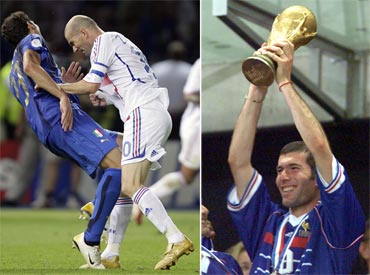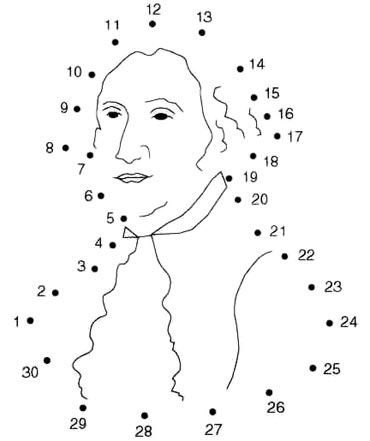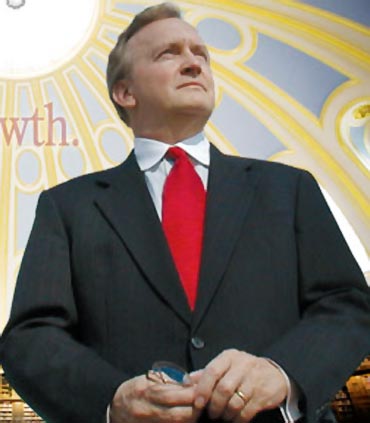 | « Back to article | Print this article |
Why taking risks is essential for career success
Football World Cup 1998, Finals! The pre-match build up was all about uneasiness in the Brazilian camp as their key striker Ronaldo seemed listless even before the whistle that began the proceedings.
Zidane and company were clinical and completed a 3-0 whitewash for France.
Cut to 2006, Germany.
The hero from 1998, Zidane shockingly head-butted his Italian opponent Materazzi only to be shown the way out with a red card. As he walked out of the World Cup one last time, somehow we all sensed what was going to be the outcome of this epic clash. The team lost the penalties eventually.
We all have to take tough decisions all the time, often more important than running wagers with friends on our favourite football team. At times, the indicators are easy to read as in the cases above, on other occasions the clues are more difficult to read. But the clues are always there, waiting to be deciphered -- by the vigilant gambler.
The author is Managing Director, SAP Labs India
Why taking risks is essential for career success
Decisions based on foundations, and with a flight
Throughout human history, the unreasonable man is always remembered for his (or her) contribution to the civilisation. Surely, we all could be a little unreasonable as well if we could see the risks clearer. Let's see how this balance works.
Find your unique method in the madness
I met this gentleman running a small KPO (knowledge processes outsourcing) setup based in the suburbs of Delhi. He had come to the conclusion that migrant employees who relocated somewhere close to the office were far better connected and committed than the typical, more qualified, Delhi based ones who lived 40 km away and had to travel three hours a day in jammed traffic conditions and only got hassles to work.
At first, I scoffed at his hypothesis but then understood what this extremely practical man had achieved. For a very specific environment, he was able to distil all the information into a very clear cause-effect relationship.
The theory was applicable in his business, and that's what mattered for his decisions as the leader. It is these quirks, these semi-calculated risks that distinguish one from another. If everything was programmable, then algorithms and software might have replaced CEOs -- thankfully technology is not there yet.
Why taking risks is essential for career success
Scratch the surface for the real truth
An organisation was keen to drive recruitment for some top positions. The VP, HR, was convinced they needed to hire from within the organisation. The problem was the internal recruitment portal was simply not getting the right attention.
Immediately a redesign was commissioned and after three months of pioneering work, the most easy to use, most inviting job portal was launched for all employees with big fanfare. Further three months down the line, the data still did not seem encouraging. The company was still resorting to hire candidates from outside. It was time to dig deeper.
The only employees who were looking at these openings with earnest were the ones that were failing to make the cut in their current assignments. Obviously, the open market was offering better quality of human resource and the company was just picking the best from the larger available lot outside.
Why taking risks is essential for career success
Connect the dots to complete the picture
I profiled a midsize set up recently and found a remarkable trend. Competition was gradually taking over market share, and the company's investment in human resources and product development was just not yielding any visible results.
The company had always ensured its employees were comfortable and in secure jobs, so it was surprising why they were not able to push the envelope now that it was required.
Some meetings later, it was evident that most employees were talking about "settling down" -- a young family to raise, a home loan to repay, income and investment patterns to set -- it was all driving people towards a rather early retirement. The only way to connect the dots and see the big picture is to start seeing the small dots first. Changes in the bonus payout schemes was the call of the hour perhaps, not strategy overhaul.
Why taking risks is essential for career success
The choices we make, dictate the lives we lead
In his book Choices, Dr Shad Helmstetter remarked "The end result of your life here on earth will always be the sum total of the choices you made while you were here".
As a professional, one makes decisions every day. Not every decision can be scientific, not every choice has a well-researched logical reasoning to it. Never would we have secured a scenario of "total information" to base a decision. It is this foresight that distinguishes successful leaders from the rest.
I was keen to get my act together, hope you can feel more confident taking bold decisions as well. Surely, we can push the envelope a lot farther by choosing to be the vigilant gambler!




